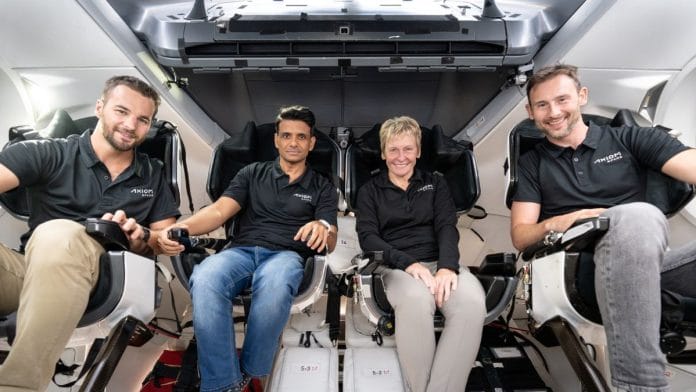New Delhi: The Axiom-4 Mission—carrying the first Indian astronaut to space in 41 years—was delayed by a day to 11 June due to bad weather in Florida, the Axiom Space team announced late Monday. In a pre-launch press conference by the US-based space tech company, they spoke about how the four mission astronauts—piloted by IAF Group Captain Shubhanshu Shukla—have prepared for the 14-day visit to the International Space Station (ISS).
“From safety protocols to complex payload operations and scientific research, the AX-4 Crew has embraced every challenge with professionalism,” said Allen Flynt, Chief of Mission Services at Axiom Space. “They completed a dry run yesterday (8 June), which confirmed all our systems and procedures are ready.”
Talking about the reason for the delay in launch, Jimmy Taeger, Launch Weather Officer for the US Space Force, said that there’s currently surface high pressure over Central Florida.
“Over the next couple of days, there could be isolated pockets of showers and thunderstorms due to this condition,” explained Taeger. “While the probability for bad weather affecting launch conditions is low at around 20-25 percent, it does look like there could be the possibility of rain during launch time.”
Taeger also said that winds in central Florida, where the Kennedy Space Centre is located, are set to improve over the next 2 days. So, in case the Wednesday attempt isn’t successful, the next scheduled launch date will be Thursday, 12 June.
Apart from Shukla, two other European scientists—Sławosz Uznański-Wiśniewski from Poland and Tibor Kapu from Hungary—will also travel onboard, along with Commander Peggy Whitson, veteran NASA astronaut.
The Monday press conference, which had representatives from NASA and SpaceX, which is providing the rocket and spacecraft for the mission, announced that this Axiom Mission was significant because it marked the first collaboration between Axiom and the Indian Space Research Organisation (ISRO).
“The mission will launch the first ISRO astronaut to the International Space Station, enabling on-board collaboration between NASA and ISRO,” said Dana Weigel, NASA’s International Space Station Program Manager. “It was highlighted by both PM Modi and President Donald Trump during the former’s visit to Washington in February.”
As part of the NASA-ISRO collaboration, the two organisations are expected to work on five joint scientific investigations and two outreach demonstrations together on the ISS, carried out by Shukla on behalf of ISRO. These include studying microalgae, sprouting salad seeds, tardigrade survival adaptations, and muscle repairs, said Weigel.
“The Mission carries the first astronauts in over 40 years from Hungary, Poland, and India to space, showing that private astronaut missions expand access to the space station for more countries,” added Weigel.
Also read: Space farming to muscle regeneration, 7 experiments by Indian institutes to blast-off on Axiom-4
Weather conditions, SpaceX spacecraft
At the press conference, it was assured that if Wednesday or Thursday are not successful for the mission launch, there are launch opportunities until 30 June, with plenty of windows for take-off.
Another media question focused on the mission’s preparedness — its fourth human spaceflight in just four years, but the first to use SpaceX’s Crew Dragon C213 spacecraft.
“Since most of the systems on this spacecraft are the same, including the propulsion system, we’ve just done the normal checks,” said William Gerstenmaier, Vice-President of Build and Flight Reliability at SpaceX. “We’ll also be watching the landing in the Pacific Ocean, which is fairly new for us.”
While the press conference did not reveal the potential date for the landing, the astronauts are expected to spend at least 2 weeks up on the ISS. Both SpaceX and Axiom have already started preparing for the landing in California, and the crew, too, has practiced landing operations.
(Edited by Zinnia Ray Chaudhuri)
Also read: What is ‘wicked smart’ Indian astronaut Shubhanshu Shukla’s role in Axiom-4 mission






